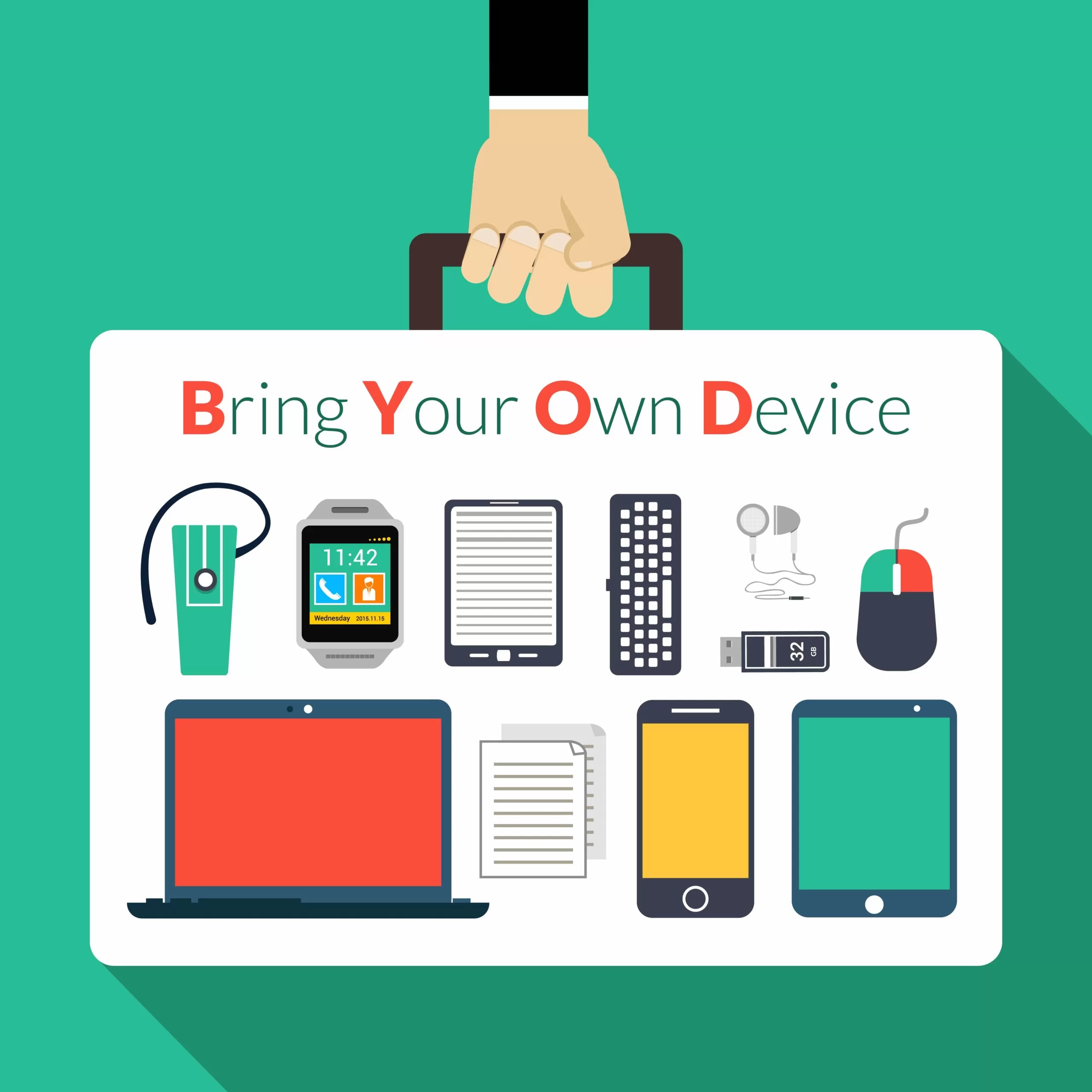Acquiring an HR software solution that is adaptable to mobile devices, tablets, laptops, and home computers can open up a whole new world for organizations. When employees and managers can access the HRIS from their own devices, it ushers the workplace into the future and allows for faster and more streamlined communications. However, BYOD options can also present a wealth of challenges.
What are the benefits and shortfalls of BYOD in the workplace? There are BOYD pros and cons that should be taken into consideration before a decision is made.
What is BYOD?
BYOD stands for “bring your own device”. Companies with BYOD policies allow employees to bring their own personal devices to the office for use at work. These devices can be mobile phones, personal computers, or other technology that is owned by the employee rather than by the company. Although there are some challenges, the advantages of BYOD make it an attractive option for many companies. Having a bring your own device to work policy is also an attractive perk for many employees and potential recruits.
Pros of Bring Your Own Device Policies
From saving on hardware costs to increasing productivity, there are many benefits to having a BYOD policy. Employees are likely to be happier using their own devices. Plus, they won’t have to keep track of or travel with multiple devices, as everything will be consolidated onto one device. The benefits of BYOD can also include cost, employee happiness, flexibility, and more.
Cost Reduction
One relatively obvious benefit of introducing a BYOD policy into a workplace is that the company won’t have to foot the bill for expensive electronics and regular upgrades anymore. Companies can spend a lot of money on providing technology to employees. If laptop computers and phones are needed for employees to do their jobs, allowing employees to use their own devices can represent a huge cost savings. While it may be necessary to invest in a few up-to-date computers, employees will most likely default to their own devices. This largely shifts the responsibility for hardware from the employer to the employee.
Improved Productivity
A study by Dell and Intel revealed that productivity levels increase when tech-savvy employees are given several different technology options. It also showed that access to a familiar and comfortable device may help employees complete their work faster. In addition, they may be able to quickly perform highly specialized functions that may have taken hours to master on another device.
Increased Employee Happiness
When employees are allowed to work from a device that is also used for personal tasks, it can improve employee contentment. Employees are free to carry fewer devices and can also keep track of every important detail in their lives from a single device. Even better, employees can choose the device that best fits their personalities and preferences for maximum engagement.
Newer Devices and Features
Because technology can carry such a high cost, many companies that do provide devices for their staff don’t update them very often. If older laptops and phones still work, it may not be in the budget for a company to replace them frequently with newer models. Employees’ personal devices are much more likely to be newer, with the latest features.
Increased Flexibility
A BYOD policy also involves increased flexibility for employees. They’re able to have more control over the devices they have to use and can make choices that benefit them the most. This can contribute to an improved work-life balance that in turn results in higher levels of productivity. Plus, it’s a lot easier for employees to work remotely if they’re using their own devices.
Cons of Bring Your Own Device Policies
Despite all of its advantages, BYOD is not without its disadvantages. Both BYOD advantages and disadvantages should be given thorough consideration before a policy is implemented. Although the company may be able to save some money with a BYOD policy, there could be other costs in security infrastructure and IT.
Security
Whenever employees or managers can access sensitive information from a personal device, security concerns arise.
If a device gets lost or is stolen, the thief or finder of the device may be able to access valuable personal information and even company secrets. Nevertheless, companies can take certain precautions to mitigate these risks by providing password-protected devices, programming devices to be remotely “wiped” in the event of loss or theft, and storing all information remotely.
Lack of End-User Support
If a company provides devices, then the company’s IT department can be responsible for supporting those devices. If employee devices are BYOD, on the other hand, IT may not be able to support them if there’s a problem. The manufacturer of the device may be able to provide support, but the company can’t control the quality or timeliness of that support. The company would have to rely on external sources to support devices that affect employees’ ability to do their jobs.
Software Difficulties
Different devices may interact with company software differently, posing additional support challenges that the manufacturer of the employee’s device may not understand how to support. IT may be able to support the software and the device manufacturer may be able to support the device hardware, but there may be support challenges involved in the interaction between the two. In addition, there may be employee devices that are not compatible with some of the company’s software.
Legal Concerns
Employees gain additional advantages with access to the HRIS from their own device. They are able to access training videos, information about the company, and many other work-related items on their own time.
These advantages can aid in improving employee satisfaction, but may also cause conflicts with existing labor laws if employees are opting to work outside their normal paid working hours. It is critical that rules regarding work hours and BYOD are clearly communicated and understood to avoid issues.
Scalability Issues
Scalability can also be an issue with a BYOD policy. Some employees may bring more than one device. Depending on your company’s network infrastructure, it may not be able to handle the increased traffic. This is especially true if many of these devices are newer and have higher demands on the network. There may be costs involved in upgrading the network so that it is able to support more devices for BYOD.
Privacy Challenges
BYOD policies often require the IT department to employ certain monitoring tools, in order to manage the device and assist with functionality when necessary. Unfortunately, this may cause conflict with privacy laws if the device is tracked and monitored, as usage is considered strictly personal as well. It is very important to thoroughly research privacy laws and IT monitoring options, and clearly communicate policies to employees to avoid these types of conflicts.
Is BYOD the Right Choice for Your Company?
Many companies are finding BYOD policies to be very successful. Employees tend to like a BYOD policy and consider it an attractive perk. It’s important to consider all of the pros and cons of having a BYOD policy and make the decision that works best for your company.
Whatever you decide, it’s important to have a policy in place outlining the expectations for personal devices at work. If none at all are allowed, then employees need to be aware of that. If you do decide to allow personal devices, then you’ll need to consider what usage is appropriate. Will certain websites be blocked on the company network or will employees have full access to the Internet? Will the company reimburse employees for the data and phone plan they choose?
Using a HRIS that Supports BYOD
If you already have a BYOD policy or are considering one for the future, it’s important to ensure that your HRIS supports BYOD. A BYOD-friendly HRIS will offer a mobile app and an employee portal that can be accessed through the Internet.
If you’re considering a BYOD policy, make sure that your HRIS software will support it. If it’s time to upgrade your HRIS so that you can incorporate a BYOD policy, visit our HR software match page and let us help you find your best option.
Sources:












